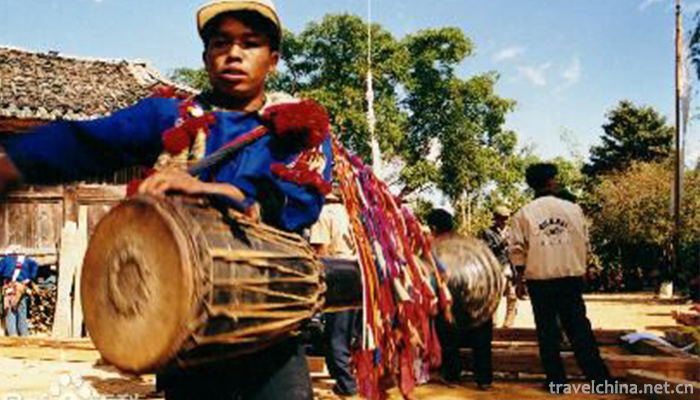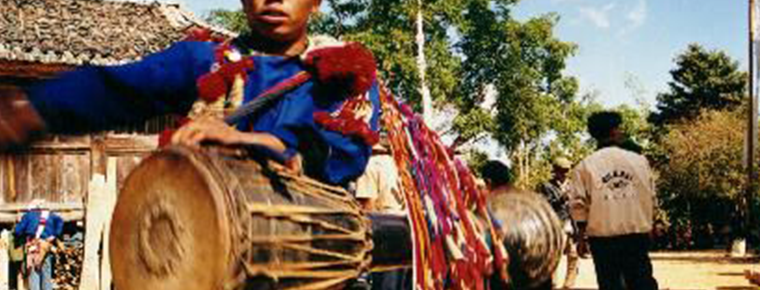Dagudarengrab
Dagudarengrab
Dagudalenglei Biao is the only Creation Epic discovered, sorted out and published by the De'ang people up to now. It is more than 1200 lines long. The epic is different from the Creation Epic of other nationalities. Its plot is simple and it always takes tea as the main line. It focuses on how this ancestor of human beings and all things on the earth transformed the world and multiplied the miracles of human beings, and uses fantasy. Personify tea. It reflects the totem worship of tea trees by the De'ang people.
On June 7, 2008, the Dagu Dai Linglei Bid declared by the Dai Jingpo Autonomous Prefecture of Dehong, Yunnan Province, was listed in the second batch of national intangible cultural heritage list with the approval of the State Council. Heritage serial number: 552 I-65.
historical origin
De'ang ethnic group is a unique ethnic group with a small population in Yunnan, and it is also a cross-border ethnic group in Yunnan Province. In the long-term production and life practice, the De'ang people, relying on their diligent wisdom and creativity, have left behind a unique national characteristics, rich and colorful, brilliant cultural heritage for mankind.
Dagudalenglei Biao is the creation myth epic of the De'ang people. The De'ang language means "the earliest ancestor legend". It entered the second batch of national intangible cultural heritage protection list in 2008. In order to effectively carry out the rescue and protection work of the project, on the afternoon of August 25, the Municipal Sports, Radio, Television and Tourism Bureau held an investigation and training on the inheritors of the De'ang Genesis Epic "Dagudalengreb" in the conference room of the Municipal Cultural Museum. Twelve people from the leaders in charge of six De'ang townships and staff of cultural stations in the city participated in the training.
primary coverage
Tea culture is a wonderful flower of De'ang traditional culture. The Dagudalenglei Biao, published as the second batch of national intangible cultural heritage, is a Creation Epic passed down from generation to generation by the De'ang people. It uniquely points out that human beings originate from tea trees and that the De'ang people are descendants of tea trees, reflecting the original thinking characteristics and values of the ancestors of the De'ang people.
Tea is the life of tea trees/tea is the AZU of all things/the sun and moon stars in the sky/the elves of tea trees/the golden sun/the shining light of tea fruits/the silver moon/the opening of tea flowers/countless stars in the sky/the blinking golden glow of tea leaves/the white clouds/the scattering veil of tea trees/the shining sunset/the gorgeous clothes of tea trees/
Tea is the lifeblood of Deon/Where there are Deon people, there are tea mountains/magical legends left to the present/Deon people still have the fragrance of tea.
De'ang people have a long history of worship and love of tea, and they are known as "tea people" and "ancient tea farmers" by other nationalities. Tea symbolizes honesty and trust in De'ang ethics. Tea is a relic and messenger. All sincerity is in the sweet and bitter aftertaste of tea.
There are many methods of tea making and drinking among the De'ang people, and the most distinctive one is the sour tea of the De'ang people. There are two kinds of techniques: one is the pit method. Before pottery was invented and used, fresh tea was harvested home, wrapped in fresh banana leaves, buried in a deep pit dug in advance for about 7 days, then the tea was taken out and kneaded in the sun for 2 days. When the tea was slightly dried, it was wrapped up and put back into the pit for 3 days, then dried and soaked. Boiling water is used when soaking. It tastes bitter and sour. It has the effect of cleaning mouth and clearing heat and relieving heat. It is a green health beverage of original ecology. Sauerkraut for cooking should be properly put in the second process for a few days, and then be grinded and dried in spring. When you eat it, you can use water to foam and then cool it. Its taste is sour and astringent, which can increase people's appetite. The second is pottery method. After the creation of pottery, sour tea was directly salted in pottery pots.
Inheritance value
De'ang people have been singing such an ancient song for generations: "Tea is the lifeblood of De'ang. Where there is De'ang, there are tea mountains." The mysterious legend has been passed down to the present day, and the tea fragrance is still floating on the body of the Deon people. "When the earth is chaotic, the sky is beautiful and full of lush tea trees." Tea trees are the ancestors of all things. The sun, moon and stars in the sky are all transformed by the spirit of tea. "These tea spirits, seeing the desolation of the earth, asked the omnipotent God Padaran:" Why can't we grow on the ground? "Padaran answered:" All the darkness in the world is full of disasters. Anyone who wants to suffer will never be able to return to heaven. "But for the sake of evergreen earth, tea plants are willing to suffer on the ground. Padaran also wanted to create a prosperous world. He tried the old tea trees and the small ones. When he saw that they all wanted to go down, the Almighty God set off a strong wind and tore up the small tea trees, causing 102 leaves to float down. These leaves have undergone a wonderful change in the wind, turned into men and women: "The singular leaves into 51 capable young men, the double leaves into 25 pairs and half beautiful girls. "
Later, four demons, red, white, black and yellow, appeared on the earth. They ran rampant and painted charcoal. Tea and the four demons fought for 90,000 years, and finally eliminated them. Tea brothers and sisters cut off their skin and flesh, crushed them into trees and flowers on the earth, and sprinkled their fairy colors on white flowers. Tea leaves only ordinary colors: green receptacles, yellowish stamens and white petals. From then on, these girls and young men lived on the earth and multiplied human beings.
The epic and the myth of "tea strangers" in the scattered narrative literature of De'ang Nationality come down in one continuous line. The De'ang people regard tea as their ancestors, which is inseparable from the life of their primitive ancestors, and is also the product of the integration of natural worship and ancestor worship. The idea of plant totem reflected in this epic of creation is relatively primitive, and its initial time seems to be very early. So this epic has been handed down till now, and its literary and cultural values are precious. "Dagu Dalengreb Biao" is sung and translated by Zhao Lalin, and recorded by Chen Zhipeng in "Camellia" (1981:2).


-
1.Longting Hotel East China Sea Shenzhen
Langting's history can be traced back to 1865. The grand opening of Langting Hotel in central London, England, has become the first truly "luxury hotel" in European history, creating a brill
Time 2018-12-16 -
2.Pagoda of Xing Jiao Temple
Hingjiao Temple Pagoda is located in the original Hingjiao Temple of Shaoling, Chang'an District, Xi'an Province, Shaanxi Province. It is a famous figure in the history of Buddhist communication
Time 2018-12-24 -
3.Tibetan knitting and embroidery
Tibetans are good at embroidery and textile, and exquisite craftsmanship adds infinite charm to their costumes, which is the most prominent manifestation of Tibetan
Time 2019-04-05 -
4.Buddha Han boxing
Fohan boxing is also known as Fohan Chuan, commonly known as Buddhist boxing. It is a kind of traditional Chinese martial arts. This boxing originated in Shaolin Temple
Time 2019-04-29 -
5.Jianhu acrobatics
Jianhu acrobatics is a kind of traditional acrobatics art of Han nationality, which originated and spread in Jianhu County, Yancheng City, Jiangsu Province. Historically,
Time 2019-05-05 -
6.Gong and Drum Art
Gong and drum art can be roughly divided into Yunsheng Gong and drum, Zhongzhou big drum, Ezhou brand gong, Xiaohe Gong and drum, Hanggu flying gong, Changshan battle drum, Taiyuan Gong and drum, Liji
Time 2019-05-15 -
7.a bottle with painted designs
Internal painting is a unique traditional craft in China. It originated from snuff bottle painting. The interior painting method is a special deformed fine brush, in glass/crystal, amber and other mat
Time 2019-06-07 -
8.Uygur Daolang Maxi Refu
Maigaiti County is located in the southwest of Xinjiang Uygur Autonomous Region. It is a typical Uygur inhabited area. About 89% of the population is Daolang Uygur who can sing and dance well. Among t
Time 2019-06-26 -
9.Wuhe Folk Song
Wuhe folk song is a traditional form of folk song which is popular in Wuhe County and its surrounding areas in Anhui Province. There are three categories: labor chant, Yangge (Tiange) and minor. Among
Time 2019-06-29 -
10.Sintering Techniques of Xingyao Ceramics
Xingyao firing technology is a local traditional handicraft in Hebei Province. Xing kiln is a famous northern kiln in China. As early as the Northern Dynasty, Xing kiln began firing celadon and a smal
Time 2019-07-08 -
11.Topography and geomorphology of Luzhou
Luzhou city is a typical mountainous city with 56.14% of the total land area. It is mainly composed of high mountains (500-1000 meters above sea level) and middle mountain (1000-1902 meters above sea level). Taking the middle Yangtze River Valley as the lowest center, it gradually
Time 2020-12-14 -
12.Yibin secondary industry
In 2019, the total industrial added value of Yibin City is 99.082 billion yuan, an increase of 9.5% over the previous year, and its contribution rate to economic growth is 45.5%. At the end of the year, there were 824 Industrial Enterprises above Designated Si
Time 2020-12-18